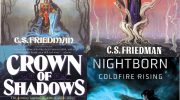We have talked to bestselling author Guy Gavriel Kay about his next book, his fascination for history and his writing career among other things. We’re also very excited to be the first to reveal the full wrap jacket of Children of Earth and Sky.

Hi Guy, Thanks for giving us some time here at SFFWorld.
 Set in a world inspired by the conflicts and dramas of Renaissance Europe, your next book, Children of Earth and Sky, is going to be released this year. Can you tell us a bit about it?
Set in a world inspired by the conflicts and dramas of Renaissance Europe, your next book, Children of Earth and Sky, is going to be released this year. Can you tell us a bit about it?
This one is inspired by some lesser-known and under-explored aspects of the Renaissance, after the fall of Constantinople. It is set in the near-Europe I have evoked before, but is a stand-alone, hundreds of years after earlier novels there. I wanted it write a book about compelling but not-powerful people, as they deal with their lives and personal goals (very different ones, too) in a time of war along dangerous, shifting borders.
What is it with this time period you find fascinating and how much research into this era did you do for this project?
Honestly, what’s not to find fascinating? It was an extraordinary time. But equally honestly, I feel the same way about the Tang and Song Dynasties in China, Al-Andalus, Late Antiquity in Byzantium, medieval Provence, Or Vikings and Anglo-Saxons! I do a lot of research, reading, travel when I can, correspondence with academics who have spent their lives working on the periods that engage me. I suffer terribly from ‘grad student syndrome’ – the feeling there are always one or two more articles to chase down before the writing can start. The research is a joy for me: I am just learning things, with no responsibilities yet…
Touching people’s emotions is something many writers wish they were able to do and that’s exactly what many of your readers say they are by your stories. For example, the ending of The Lions of Al-Rassan was very emotional for many readers. How do you react to such feedback and without revealing too much, will there be more heartbreaking moments with Children of Earth and Sky?
At a very basic level, novelists, storytellers, are trying to engage people intensely. I want readers caught emotionally and intellectually by a book, so these response are obviously wonderful. On another level, if you write a book where the stakes are purportedly high, in whatever way, it feels like a cheat to me if the story is consequence-free for protagonists. It is worth remembering that consequences, what feels intense for readers can have a wide range. People have said that they grieved for the loss of a mosaic in Lord of Emperors more than for deaths in many others’ books. That touches me a lot. We access our emotions in varied ways, and that applies to books, too.
Real history seems to be important for you in many of your stories, whether it’s Renaissance Europe or Chinas Tang Dynasty. Have you always been interested in history?
Short answer: very much so. My studies were in Philosophy, English, and Law, my passion has always been for history.
Why do you choose to set your stories in a fantastical setting and not just write historical fiction?
I’ve written speeches and essays about this, it is impossible to answer properly in the space we have here. One component: I don’t want to ‘use’ real people, real lives, as if I know what El Cid’s marriage was like. I prefer the moral and artistic freedom that comes from using characters inspired by real ones but not – obviously not – identical with them, or pretending to be.
 In The Lions of Al-Rassan you set up ibn Ammar as a masterful poet and then actually gives us samples of his poetry which is very good. I know you also have a collection of poetry, but how nerve-wracking was it to actually set up ibn Ammar as a masterful poet and how hard was it to compose those poems?
In The Lions of Al-Rassan you set up ibn Ammar as a masterful poet and then actually gives us samples of his poetry which is very good. I know you also have a collection of poetry, but how nerve-wracking was it to actually set up ibn Ammar as a masterful poet and how hard was it to compose those poems?
A sense of creative responsibility to do it as well as possible, more than ‘nerve-wracking’, or I’d say nerve-wracking in the same way the whole of a novel is! I did the same thing with poetry in Under Heaven and River of Stars, too, and with troubadour songs in A Song for Arbonne. Poetry was my first writing, my first recognition, it feels natural to me when I work with it in the novels – especially when the characters are poets!
Speaking of poetry. Beyond This Dark House was released back in 2008. Do you have any plans for more poetry collections?
I’m still writing poems, occasionally one is published somewhere, but I’m too slow with these, focusing on the novels, to be planning another collection soon.
Thinking back, how did you start writing? Was there a particular book or moment in your life that spurred you on?
I always wrote. The turning point is probably when I promised myself a year off after graduating law, to see if I could conceive and actually complete a novel. I ‘fled’ to the south coast of Crete (as one does), having bought a used typewriter in the flea market in Athens, and did write a first (never-published) book. But it found an agent, got wonderfully generous rejections from major houses, and crystallized my awareness that this was what I hoped to be able to keep doing. The Summer Tree followed a couple of years later.
To start with you worked with Christopher Tolkien when editing The Silmarillion and he has commented that “almost every substantial change” was discussed with you. How did you end up with this job, I believe you were a university student at the time?
Long time ago now! Short answer is it was originally a connection between his wife’s family and mine that caused us to meet. For a variety of reasons he didn’t want another fully-fledged academic working with him, and he also conceived of the project originally as scholarly, so a model of a senior academic and bright student fit both his concept and the academic tradition. It developed differently, of course.
In which way was Tolkien’s epic fantasy an inspiration for you when you wrote The Fionavar Tapestry?
This also needs a long answer. But part of it is that I had become unhappy with genre writing that went back to Tolkien but not to the roots in legend, myth, folktale that he used. I wanted to try going back to those, but to honour the trilogy as one such root element. I even made Fionavar a trilogy for that reason, and to see what I could do with the ‘middle book problem’, since I had some ideas.
In terms of process, how do you structure a story? Do you heavily outline, loosely outline, or base your work on pure discovery? What works best for you?
I always preface this answer by saying this is me only, not any kind of advice. But I don’t outline. I find that when the novels are a discovery process for me they are more likely to be so for readers. I start with setting and themes, characters emerge, and narrative.
What has been most surprising to you in your writing and publishing career so far?
Numerous things, in fact, because publishing has changed so much since I started. Hard to pick a ‘most’ among many. I feel surprised and fortunate I’ve been able to succeed while doing work that slips in between the fantastic and historical fiction, with some modern themes and language ambitions – without necessarily adopting the norms and tropes of any of these. That amounts to a gift from my readers, really.
Your books have been translated into numerous languages and you’ve traveled the world to promote your books. How do you find the reception among fans different in around of the world?
One of my greatest pleasures is dealing with editors and readers in different languages. It reassures and inspires as to the power of art to link people, reveal shared desires and responses. There are differences, too, and these also fascinate. In Croatia and Poland, and in Korea and Quebec, and Mexico (widely varied places, obviously), for example, one of the first questions, if not the very first, in person or by email, has been, ‘Were you writing Tigana about us?’ This is, of course, at the heart of why in Tigana I made use of a fantasy setting: such a book can be about any and all places, exploring a theme of conquest and lost identity in a universalizing way, but some countries register this very intensely because of their own history.
What’s next? What other projects are you working on at the moment?
Children of Earth and Sky, will be published (in English) in May, so my energy is focused on that, and will be until late summer. At that point I’ll start addressing the nagging voice that asks what you just did: ‘What’s next?’!
* * * * * * *
Interview by Dag Rambraut and the SFFWorld Forum – SFFWorld.com © 2016




